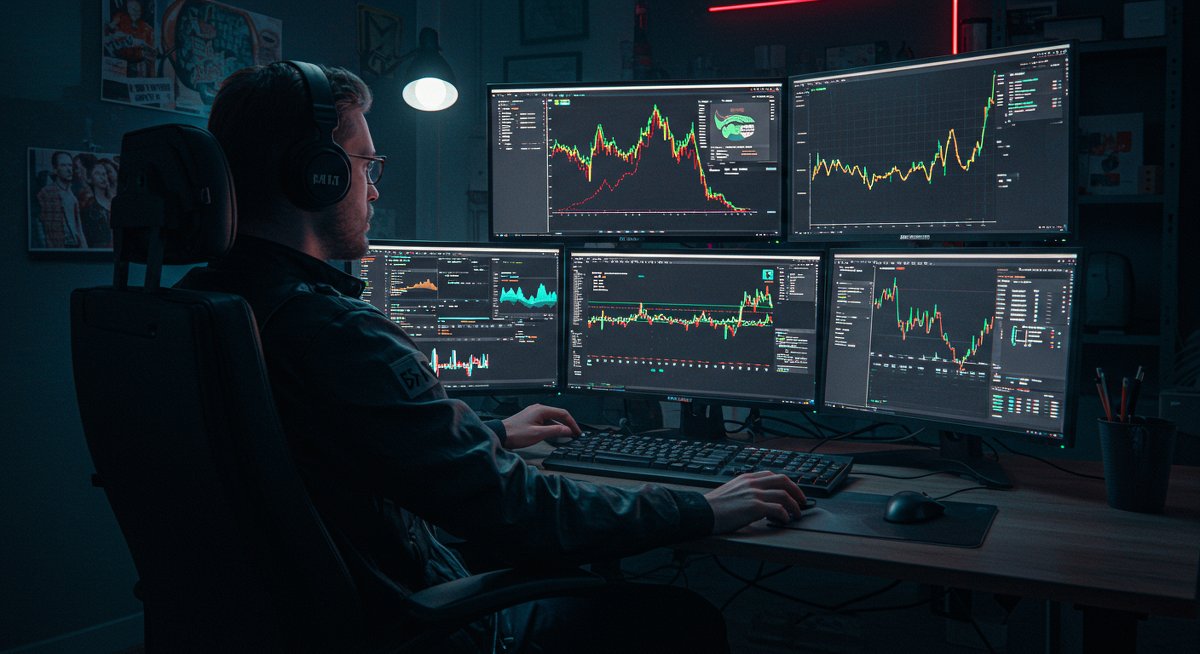That Reddit Post That Got Me Thinking About Bitcoin
I came across this Reddit post the other day that really made me think. Someone was sharing a reminder from a Reddit bot about a post they made three years ago. Basically, the original poster was asking for medium-term investment advice. This person, let's call him "Bitcoin OG", suggested Bitcoin. The other person went with an Index ETF instead. Fast forward three years, the ETF rose about 52%. Not bad, right? But Bitcoin? Bitcoin went up a whopping 405%.
It's easy to look at those numbers and say, "Wow, Bitcoin is the clear winner!" But there's more to it than that. This isn't just about bragging rights or saying "I told you so." It's about understanding the potential of different investment strategies and how they fit into your own financial goals, especially if you're trading crypto from outside the US. I mean, the global perspective on crypto is wildly different, and that definitely plays a role in how we make these decisions. The tax implications alone vary so much from country to country.
So, what can we learn from this little Reddit reminder? How can we apply these lessons to our own crypto journeys? Let’s break it down, not just as a Bitcoin pump piece, but as a realistic look at the crypto market for the average person trying to navigate this world. We'll also look at the risks because, believe me, there are risks.

Why Bitcoin’s Growth Isn't Just Dumb Luck
Okay, so 405% is a huge number. But it's important to understand why Bitcoin performed so well. It's not just some random stroke of luck. Several factors contributed to this surge, and understanding these factors can help you make more informed decisions about your own crypto investments.
First, there's the increasing adoption of Bitcoin by institutional investors. Big companies are starting to add Bitcoin to their balance sheets, which lends legitimacy to the cryptocurrency and drives up demand. Think of companies like MicroStrategy or even Tesla briefly holding Bitcoin. That sends a message to the market.
Then there's the limited supply of Bitcoin. There will only ever be 21 million Bitcoins in existence. This scarcity, combined with increasing demand, creates a powerful upward pressure on the price. It's basic economics. And unlike traditional currencies, which governments can print at will (devaluing existing holdings), Bitcoin's supply is fixed by its code.
Finally, we have to consider the macro-economic environment. Over the past few years, we've seen rising inflation and economic uncertainty. Many people see Bitcoin as a hedge against these risks, a store of value that can protect their wealth from the eroding effects of inflation. This is the "digital gold" narrative that you often hear, and it's becoming increasingly relevant in today's world.
So, What Does This Bitcoin Surge Mean for Your Crypto Portfolio?
Now, let's get down to brass tacks. What does this Bitcoin surge actually mean for you and your crypto portfolio? If you're already holding Bitcoin, congratulations! You've likely seen some significant gains. But the question now is, what do you do next?
If you're not holding Bitcoin, should you jump in now? That's a more complicated question. On one hand, Bitcoin still has plenty of potential for growth. On the other hand, the price has already risen significantly, so you might be buying at the top.
Here's what I would consider: First, think about your risk tolerance. Bitcoin can be volatile, so make sure you're comfortable with the possibility of price swings. Never invest more than you can afford to lose. Secondly, consider your investment timeline. Are you looking for short-term gains or long-term growth? Bitcoin is generally considered a long-term investment. Finally, do your own research. Don't just take my word for it. Read up on Bitcoin, understand the technology, and make your own informed decision.
Diversification is also key. Don't put all your eggs in one basket. Consider diversifying your portfolio with other cryptocurrencies or traditional assets. Remember that ETF that only went up 52%? It's probably less volatile than Bitcoin. There's a case to be made that slower, more stable growth is actually better, depending on your goals and situation.
The Stuff Nobody Tells You About Bitcoin Trading
Okay, let's talk about the stuff nobody likes to talk about: the risks. I'm not trying to scare you, but it's important to be realistic about the potential downsides of investing in Bitcoin.
Volatility is a big one. Bitcoin's price can swing wildly, even in short periods of time. You could see your investment plummet by 20% or 30% in a single day. Can you stomach that kind of volatility? If not, Bitcoin might not be the right investment for you.
Security is another concern. Bitcoin is stored in digital wallets, which can be vulnerable to hacking and theft. Make sure you take steps to protect your Bitcoin, such as using a strong password, enabling two-factor authentication, and storing your Bitcoin in a secure wallet. Hardware wallets, which store your Bitcoin offline, are generally considered the most secure option.
Regulation is also a risk. Governments around the world are still grappling with how to regulate Bitcoin. New regulations could potentially impact the price of Bitcoin or make it more difficult to buy and sell. Always be aware of the regulatory landscape in your country and how it might affect your Bitcoin investments.
Finally, remember that Bitcoin is still a relatively new technology. There's always the risk that something could go wrong, such as a bug in the code or a failure of the network. While these risks are relatively small, they're still worth considering.
What If You're Trading Bitcoin from Outside the US?
If you're trading Bitcoin from outside the US, there are a few additional things to keep in mind. First, you need to be aware of the tax implications in your country. Crypto taxes vary widely from country to country, so it's important to understand the rules in your jurisdiction. Some countries have very strict rules. Others are more lax.
You also need to consider the regulatory environment in your country. Some countries have banned Bitcoin outright, while others have embraced it. Make sure you're trading Bitcoin legally in your country. Don't assume that just because it's available on an exchange, it's legal.
Currency exchange rates can also impact your Bitcoin investments. If you're buying Bitcoin with a foreign currency, you need to factor in the exchange rate when calculating your profits and losses. Exchange rate fluctuations can eat into your gains, so be mindful of this.
Finally, be aware of the potential for scams and fraud. The crypto world is rife with scams, so it's important to be extra careful when trading Bitcoin from outside the US. Stick to reputable exchanges and wallets, and never give out your private keys to anyone.

How to Actually Start Trading Bitcoin (the Real Steps)
Okay, so you've done your research, you understand the risks, and you're ready to start trading Bitcoin. How do you actually do it? Here's a step-by-step guide:
First, choose a reputable crypto exchange. There are many exchanges to choose from, but not all of them are created equal. Look for an exchange that has a good reputation, a secure platform, and a wide range of trading pairs. Some popular exchanges include Coinbase, Binance, and Kraken.
Second, create an account and verify your identity. Most exchanges require you to provide personal information and verify your identity before you can start trading. This is to comply with anti-money laundering regulations.
Third, deposit funds into your account. You can usually deposit funds using a bank transfer, credit card, or debit card. Some exchanges also accept cryptocurrency deposits.
Fourth, buy Bitcoin. Once you have funds in your account, you can start buying Bitcoin. Simply enter the amount of Bitcoin you want to buy and click the "buy" button.
Fifth, store your Bitcoin in a secure wallet. Once you've bought Bitcoin, it's important to store it in a secure wallet. As I mentioned earlier, hardware wallets are generally considered the most secure option.
Sixth, monitor your investments and rebalance your portfolio as needed. The price of Bitcoin can be volatile, so it's important to monitor your investments regularly. You may also want to rebalance your portfolio from time to time to maintain your desired asset allocation. Don't just buy and forget.
My Personal Take: Bitcoin Isn't a "Get Rich Quick" Scheme
So, what's my take on all this? Am I saying that Bitcoin is the key to instant wealth and financial freedom? Absolutely not. Bitcoin is not a "get rich quick" scheme. It's a long-term investment that requires patience, discipline, and a good understanding of the risks.
But, I do believe that Bitcoin has the potential to be a valuable part of a diversified investment portfolio. Its limited supply and increasing adoption make it a potentially attractive store of value. However, it's important to remember that Bitcoin is still a relatively new and volatile asset, so you need to be prepared for the possibility of price swings.
Ultimately, the decision of whether or not to invest in Bitcoin is a personal one. There is no guarantee of profit, and you could lose money. Do your own research, understand the risks, and only invest what you can afford to lose. If you do that, you'll be well on your way to making informed decisions about your crypto investments. And who knows, maybe in three years, you'll be sharing your own Reddit success story about Bitcoin. Or maybe something else will be the winner. That's the fun - and risk - of this whole crypto game.